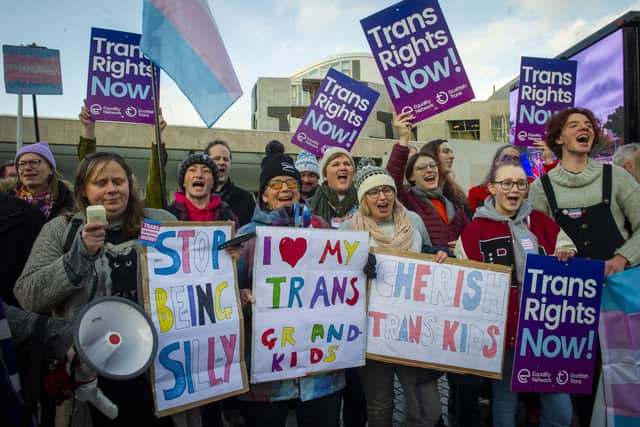Humza Yousaf accuses Labour of 'backtracking' on gender self ID stance as GRA reform rift deepens
First Minister Humza Yousaf said voters could not “trust a word” Labour said under Sir Keir Starmer as shadow women and equalities secretary Anneliese Dodds outlined a revised party position on gender legislation.
Ms Dodds vowed to reform the “outdated” Gender Recognition Act as she claimed the SNP’s approach had been more about “picking a fight with Westminster” than helping trans people.
Advertisement
Hide AdAdvertisement
Hide AdBut the insistence that a medical diagnosis of gender dysphoria would remain under Labour’s plans amid criticism of the Scottish Government’s drive to support a system of self-identification sparked a defiant reaction from inside Scottish Labour's ranks.


Paul O’Kane, Scottish Labour’s social justice spokesperson, distanced the Scottish branch of the party from Ms Dodds’ comments, saying: “Labour is committed to modernising and reforming the outdated and intrusive Gender Recognition Act, as well as ensuring exemptions in the Equality Act are upheld.
“Scottish Labour continues to support the demedicalisation of the process in Scotland.”
Former Scottish Labour leader Richard Leonard refused to back Ms Dodds’ remarks, Labour’s Scotland Central MSP Monica Lennon also dismissed the claims, tweeting: “Labour has a proud history of advancing LGBTQ equality and women’s rights. To build on that, we must overcome fear and hate.
“The Scottish Labour manifesto rightly makes clear that our policy is to reform the Gender Recognition Act to demedicalise the process”.


Ms Lennon had previously criticised Sir Keir for "undermining" the Scottish party over the reforms, following the Labour leader questioning the planned reduction in the age at which someone can apply for a gender recognition certificate from 18 to 16.
Ms Dodds had earlier claimed her party would overhaul “outdated” laws to make it easier for transgender people to transition while maintaining protections for single-sex spaces.
But she set out UK Labour’s opposition to a self-identification system – a plan that had been endorsed by Holyrood, but blocked by the UK Government, following the use of a section 35 order by Scotland secretary Alister Jack.
Advertisement
Hide AdAdvertisement
Hide AdThe policy position represents another U-turn for Sir Keir’s party, who vowed to "introduce self-declaration for transgender people" in 2019.


The issue has also threatened to create a major rift with Scottish Labour, which under Anas Sarwar backed the Scottish Government’s proposals, with MSPs including Mr O’Kane, Pam Duncan-Glancy, Pauline McNeill and Daniel Johnson explicitly calling for removing medical diagnosis or "de-medicalisation" from the process of transitioning.
Writing in The Guardian, Ms Dodds insisted her party would support trans people in Government. She said: “Changing gender is not a decision anyone makes lightly.
“The process is intrusive, outdated and humiliating. So we will modernise, simplify and reform the gender recognition law to a new process. We will remove invasive bureaucracy and simplify the process.”
The Gender Recognition Act was passed by Labour in 2004, but Ms Dodds claimed “now, in 2023, we have a much better understanding of the barriers trans people face”.
Criticising the SNP proposals, Ms Dodds insisted Labour would “protect legitimate applications” and keep women safe.
She said: “Last year, the Scottish National party’s cavalier approach to reforming gender recognition laws seemed to be more about picking a fight with Westminster than bringing about meaningful change.
"The safeguards that were proposed to protect women and girls from predators who might abuse the system were simply not up to scratch. As a result, the Scottish Government is still picking up the pieces, with trans rights no further forward”.
Advertisement
Hide AdAdvertisement
Hide AdShe said this would mean a medical diagnosis was essential, and Labour would “not make the same mistakes”.
Ms Dodds said: “The requirement to obtain a medical diagnosis of gender dysphoria remains an important part of accessing a gender recognition certificate. That’s especially the case now that gender dysphoria is no longer classified – and stigmatised – as a psychiatric disorder.
“It can help refer trans people into the NHS for support services. Nearly a quarter of trans people don’t know how to access transition-related healthcare. Requiring a diagnosis upholds legitimacy of applications and confidence in the system."
Ms Dodds also accused Lee Anderson, the Conservatives’ deputy chair, of trying to “stoke division” after he suggested the Tories should focus on “a mix of culture wars and trans debate” to hold on to power.
Responding to Labour’s attacks on the SNP’s own gender reform plans, Mr Yousaf said: “It seems like they are backtracking on rights for one of the most marginalised groups in the country, just like they backtracked on tackling the climate emergency and tackling poverty by scrapping the two child cap.
“The worry is you can’t trust a word they say, so even if it is going the right way, who knows what Keir Starmer will say next?
“The real change is not between a Westminster that’s blue or a Westminster that’s red - it is about choosing our own future with independence.”
There was also condemnation from LGBT charity Stonewall, which defended gender recognition reform (GRR) as the “most scrutinised piece of legislation ever passed by the Scottish Parliament”.
Advertisement
Hide AdAdvertisement
Hide AdThe body said: "The UK has fallen off track as an international leader on LGBTQ+ rights. Just eight years ago, we had the best LGBTQ+ rights in Europe, in 2023 we stand in 17th place.
“It is also important to note that the [GRR] Bill was backed by every established women’s organisation in Scotland, including Women’s Aid, Amnesty International, Engender and Rape Crisis Scotland. The vast majority of women MSPs voted in favour of the Bill. The majority of Scotland’s women MSPs, feminist advocates and policy experts are satisfied that the provisions in the Bill do not have negative impacts on women and girls in Scotland. If Labour are serious about reforming the Gender Recognition Act and enhancing trans people’s legal protections, we need a strategy informed by input from trans people on their needs and priorities, and a real understanding of how practice is working internationally, not just on legal recognition, but healthcare, anti-discrimination and education.”
A LGBT+ Labour spokesperson said: "It is very concerning that the Labour Party are signalling a retreat on their policy of demedicalised self-ID for the trans community at the next general election. We will continue to lobby and fight for the rights of all LGBT+ people and push the Labour party to go further for our trans siblings, including on demedicalised self-ID, and to build on their legacy as the party of equality.”
Comments
Want to join the conversation? Please or to comment on this article.
